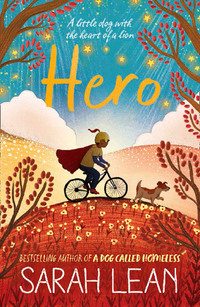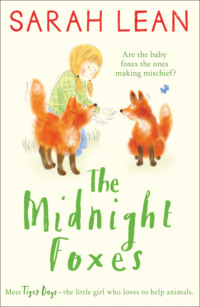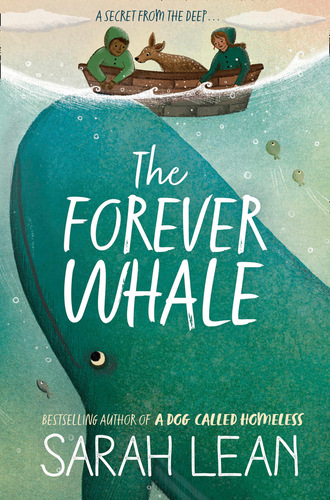
Полная версия
The Forever Whale
I remember tucking my head into his shoulder.
“What was the great thing?”
I remember feeling his wide chest heave as he took in a giant breath. I remember the dark and the quiet and the glimmer of light from the hall. I remember him saying, “Another time. Go to sleep now, little Hannah.”
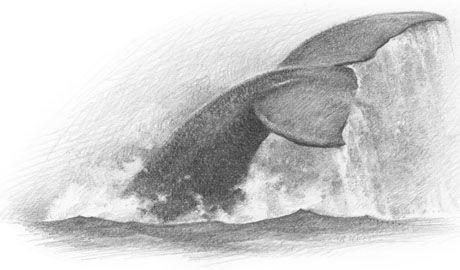
4.
JODIE NUDGES ME. “HELLO? WHERE WERE YOU?”
I was thinking about the story Grandad had been meaning to tell me, wondering if it had anything to do with Grandma. I want him to remember because August 18th is getting closer, but no matter how many times I’ve said it, he doesn’t know why he asked me to remind him. None of us have birthdays on that day, no anniversaries, nothing like that, I checked. I think it must be to do with a memory Grandad has, something important that scoops him up and takes him back to another time so he can feel those things that happened all over again.
I think of how important it is for all of us, but especially for Grandad, to remember the bright things from the past. There must have been so many of them to make him so special, or maybe just one extraordinary thing. I hate that Alzheimer’s doesn’t always let him go back to times and places he loved the most, when I can, just like that, if I want to.
I’m still on the kitchen floor with Jodie.
“Do you remember Grandma?” I ask her.
“Not much.” Jodie looks disappointed with herself for a moment. “She had soft cheeks, that’s what I remember, and she always had toffees in her cardigan pocket. You could hear the papers rustling.” She pinches my cheek and pushes a chocolate bar into my hands. “You’re little and soft like Grandma was,” she smiles.
Grandad comes into the kitchen. “Time for breakfast,” he says.
“I’ll make you some more toast, Grandad,” I say.
I cut some more bread, put it in the toaster this time and turn the timer up high.
“My class is going on a field trip down to the quay today,” I tell him as we sit to eat our toast. “The mayor is unveiling a statue of a lifeboat. They’ve put a big cover over it so nobody can see it until today. Would you like to go down at the weekend and see it too?”
Slowly Grandad turns towards me. “We’ll hide my boat at Hambourne where nobody will find it.”
Right then I feel as if I’m on my own in the boat at sea, and I can’t see solid land on the horizon, and there’s nowhere safe to go. I’m about to tell Grandad that his boat is in the garage, but sometimes when I correct what he says he gets confused and I don’t want to upset him.
The dark edges of his toast crumble and fall into his lap. He doesn’t notice.
“Hannah,” Jodie says, breaking the uncomfortable silence, “we’d better get going.”
She picks up her bulging book and some photographs fall out from between the pages and scatter on the table. Three are of my grandma, Hannah Jenkins, who I never knew; three are of me, Hannah Gray. All of the photos are rippled and flaking from the dampness in the cupboard.
Grandad’s eyebrows furrow as we all look at the photos.
“Where’s Hannah?” he says. “I haven’t seen her this morning.”
Jodie stares at me, chewing the pad of her thumb. I try to hide what feels like a stone dropping in my stomach. She doesn’t say what I know she’s thinking, that neither of us knows whether he’s forgotten that Grandma died over ten years ago or if he’s now starting to forget me.
Jodie goes to the front door, but I can’t leave, not yet. I want to believe that when I come back this afternoon Grandad will be as he always was. I lean my hand on the table and kiss the white beard on his cheek.
“We’re going to school now,” I say.
His eyes brighten for a moment and he doesn’t know what he’s just said, but I see something unfamiliar in his face.
“Grandad, please remember the story you were going to tell me. About the deer, about a journey. It’ll be August the eighteenth soon.”
His eyes flicker as if he’s searching for something. He rubs his beard and I hear the bristles. I see brightness in his eyes, as if he’s found something.
“Hannah!” Jodie calls. “We’re going to be late!”
Grandad moves his hand and mine disappears underneath his.
“It’s quite a story, Hannah, about the greatest power on earth.”
I’m not sure if we can wait until August.
“Hannah, you have to come now!” Jodie shouts.
“Tell me about it after school, Grandad,” I say and kiss him again. “Today!”
“Today, after school, I’ll be waiting,” he says. “Let’s see if we can find that whale.”
“A whale?” I say, but Jodie has come back in and is dragging me away. “A whale, Grandad?” I call.
“Don’t forget,” I hear him say.
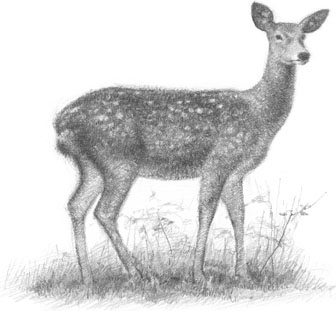
5.
THE MAYOR’S GOLD CHAIN LOOKS HEAVY, AND AT last he stops talking to the crowd and holds up a huge pair of scissors to cut the red ribbon around the statue. Four people are behind him, holding the corners of a big shiny black sheet so nobody can see what’s underneath.
Josh Beale makes a noise like he’s dying for some unknown reason, so our teacher tells him to shush, but he carries on gargling. I want to blank him out because I’m trying to think about what Grandad said this morning. I thought he wanted to tell me an important story about the deer, but he said we were going to find a whale. I don’t understand. I’m thinking about how Alzheimer’s disease is making me confused too.
A photographer from the local paper tells the mayor to wait a minute.
“Can we have some kids from the local school up there as well?” he says. “And a teacher.”
I am one of the children who get picked and we line up either side of the mayor and pretend we’re helping to hold the ribbon.
Everyone counts down, three, two, one. The scissors snip.
The four people let go of the cover and it billows above our heads, puffed up by the sea breeze. I feel the cool shadow over me as it ripples over our heads, falls and shrouds us. For a second the world goes dark and I smell something metallic. The people who were holding on to the cover drag it away again and everything seems just as it was. The crowd gasp then clap, but I have a funny feeling, like someone is standing behind me.
I turn round. The life-size statue is of a smooth golden-bronze figure, with no nose or eyes or mouth. It is leaning over the bow of a boat and reaching an arm to someone who is in the sea who doesn’t have a proper face either.
“Hey, you, little girl,” the photographer says, “look this way. Everyone smile.”
I can’t stop looking at the statue of the people with no faces. I see how hard the person in the boat is reaching for the one lost at sea.
I nudge Linus Drew who is standing next to me.
“Who is it?” I ask him.
“Who’s who?” he says.
“The statues. How are we supposed to know who they are if they don’t have faces?”
Linus shrugs, which is what he does a lot of the time. Our teacher hears me.
“They represent anyone,” Mrs Gooch says. “We’ll be talking about it later in class and reflecting on what we feel about the statue.”
I think of Grandad and how this morning he looked at me but didn’t see me. It feels like the shadow of the black cover is still over me.
“Anyone?” I say, catching Mrs Gooch’s arm. “How can a person be anyone? Surely they have to be someone?”
“Well, yes, that’s a good question, but this is art, Hannah, so there might be lots of possible meanings. Maybe we can find something of ourselves in it.” Mrs Gooch waits for me to say something. “Is everything all right?” she asks.
I nod. But it’s not true. Everything isn’t all right and I want to talk about it, but I’ve not told anyone that my grandad has Alzheimer’s. All my friends know him because of all the years he used to take me to and from school. He was the BFG at the school gates who lifted us up high in his arms and asked us to tell him what we’d been doing that day. I had told my friends Grandad didn’t come any more because we’d got too big and because I could walk to school on my own now.
Alzheimer’s isn’t like a broken leg or the flu; it’s buried in someone’s brain. You can’t see it. You just notice what’s missing. People don’t like it when it’s something to do with brains and not being normal.
We line up to go back to school and I’m partnered with my friend Megan. Mrs Gooch walks beside us.
“Megan?” Mrs Gooch says. “What did you think of the statue?”
“I thought it was nice because it’s to remember all the people who helped save lives at sea,” Megan says.
“Yes, it is. And how does it make you feel?”
I’m listening, but I don’t really want to join in now.
“I feel … like it’s good that we have people who will help us if we need them. And,” Megan continues, “it reminds me that I have to wear a life jacket when we go out in my uncle’s boat.”
“So it also reminds you of something to do with yourself. What about you, Hannah?” Mrs Gooch says. I look back at the statue, at the people who could be anyone.
“I don’t like that they don’t have names,” I say. “I want to know who they are.”
Is it just my name that Grandad is forgetting? Or is it much more than that? What about all our journeys in his boat, all our thousands of mornings, our talks, all the things that tie us together? Will he remember the story? Will he remember me when I get home?

6.
“GRANDAD?” I CALL AFTER SCHOOL, WHILE I FLICK on the kettle for him. I’m still thinking about the statue on the quay. Mrs Gooch said we could all try and find something of ourselves in the statue, but I’m thinking of Grandad instead.
The back door is open. At first I think I see ashes outside on the patio, and I remember the burnt toast from this morning. But they aren’t ashes. They’re tiny red and brown feathers.
My stomach turns to stone. I call Grandad’s name and run upstairs and look in all the rooms, but I’m already thinking that Smokey wouldn’t dare come so close to the house to take a bird if Grandad was here.
I come back to the kitchen. Grandad’s newspaper isn’t on the table.
Grandad doesn’t walk as well as he did, but most days he used to go as far as the shop down Southbrook Hill to get a bar of chocolate and a newspaper and some birdseed. On the way to the shop he’d stop to talk to Mr Howard who clips his box hedges with tiny shears into Christmas puddings and cones and clouds.
I run down the street. Mr Howard is clipping his hedge as usual.
“Have you seen my grandad today?” I call.
“Yes, he was headed thataway.” Mr Howard points with his sharp snippers towards Southbrook Hill. “I wished him a good afternoon, but he walked past without so much as a friendly word. I told him he looked a little peaky, but … well, that was nearly an hour ago.”
I am already running towards the hill.
Grandad isn’t at the shop. Suddenly my mind is racing, thinking of how he was when I left this morning. Had he heard me after all? Would he have gone to see the statue at the quay by himself? I take the road that leads down to the old town.
Papers rustle and tumble along the cobbled street, blown by the sea breeze coming through an alleyway between the shops. At the end of the alleyway I stop to catch my breath and look both ways. I hear boat masts clanking along the quay like alarms. In the distance I see Grandad shuffling unsteadily away from the new statue towards Hambourne slipway. I keep running.
Coming towards Grandad from the opposite direction I see Megan, Josh and Linus, who is on his scooter. As they pass Grandad, they speak to him. Megan watches over her shoulder, but Grandad doesn’t turn round so she stops and walks back to him. He looks down at the slipway, then out to sea.
“Grandad?” I call as I reach him. “What are you doing here?”
I hook my arm through his. He looks down at his other clenched hand. The ocean of nothing is in his eyes.
“Come on,” I say. “You’ve walked all the way to Hambourne slipway. Let’s go home now.”
I try to lead him away, but his arm is heavy. Megan, Josh and Linus stand uncomfortably nearby. “What’s wrong with him?” I hear Josh say to Linus.
“Grandad?” I say. “Let’s walk home together.”
“Do you want us to go?” Megan says.
But they don’t go and I can’t think what to do.
“Mr Jenkins,” Linus says. “Hannah and me will walk you home.”
Linus lays down his scooter and tries to take Grandad’s other arm.
“This way,” he says, but Grandad trembles.
“Grandad, please, it’s me, Hannah,” I say as a tear falls from his eye. “You’re safe.”
“Shall I get someone to help?” Megan says.
He’s fine, I want to say. But I see the unstoppable grey-green tide rushing away from the slipway steps, in the same way that Alzheimer’s is dragging Grandad away from me. Grandad doesn’t know who I am.
“Grandad, it’s me, Hannah. Remember, we’re going to go on a journey?”
I see a flicker in Grandad’s eyes. “The whale … it’s coming,” he says. He tries to speak again, but a sore groan comes from his lopsided mouth. He opens his hand.
Josh jumps back and falls over Linus’s scooter, tearing his knees on the pavement. Megan gasps and backs away. Only Linus stays beside me and stares at the robin, at the ounce of lifeless feathers in Grandad’s hands.

7.
“HOW LONG WILL GRANDAD BE IN HOSPITAL?” Jodie says that night.
It was a stroke that took a whole chunk more of Grandad away from us. The blood supply to his brain had been interrupted and more brain cells had died. It made the symptoms of Alzheimer’s worse, like he’d jumped down a whole staircase instead of taking the disease step by step.
Mum shakes her head. “We don’t know, love. He’s going to need some help to get him back on his feet again.”
“And then he’s coming home,” I say, “so that I can look after him.”
Mum and Dad glance sideways at each other.
“We’re not sure what the process is just yet,” Dad says. “Grandad is going to need a lot of therapy over the next few months—”
“Months?” I ask. He can’t be in hospital for months. I have to remind him of August 18th. I have to know what the story is so that we can go on our journey together.
“Weeks,” Mum says, “it might only be weeks.” Again she glances at Dad.
“Did Grandad say anything?” I ask. “Anything about me or anything at all?”
Mum shakes her head. “I don’t know if he knew it was me,” she says quietly. “I don’t think he recognised either of us.”
I push between Mum and Dad on the sofa, the only space I can see that feels safe.
“Can we visit him?” Jodie says, squeezing on the other side of Mum.
“Not just yet,” Dad says.
Mum touches Dad’s arm. “He’s very confused and weak at the moment,” she says. “I’ll go in tomorrow to check how he is and let you all know. Then we’ll see when he’s up to having more visitors.”
We know that nobody gets better from Alzheimer’s, but the doctor said it’s possible Grandad can recover from some of the symptoms of the stroke. But the way Mum described him sounded all wrong, like it was someone else in hospital, not my grandad. I keep thinking he’s still here, somewhere, only I can’t find him.
I get up from the sofa.
“I don’t want to see him in hospital,” I say. “But when he comes home, there’s something we have to do.”
“What’s that?” asks Dad.
They all look at me and I’m not sure now how to say what I’m thinking. Our journeys were about being together and discovering things, and seeing the world in front of us with bright eyes and open ears. I was going to take him out in the boat again. We wouldn’t go far – we’d stay in the inlets and quiet harbour waters. Because I’m sure, if we did, he’d remember everything he wanted to tell me.
“We’re going to take a journey together,” I say, but don’t wait for them to ask questions because I can’t explain anything more. How can I tell them that I think we’re going to find a whale?
I go out to the kitchen and rummage through the cupboards until I find the spray gun. I fill the bottle with cold water from the tap. I go out to the garden and shout into the night shadows, “Just you wait until Grandad gets back, Smokey! I know it was you that killed the robin.”
Конец ознакомительного фрагмента.
Текст предоставлен ООО «ЛитРес».
Прочитайте эту книгу целиком, купив полную легальную версию на ЛитРес.
Безопасно оплатить книгу можно банковской картой Visa, MasterCard, Maestro, со счета мобильного телефона, с платежного терминала, в салоне МТС или Связной, через PayPal, WebMoney, Яндекс.Деньги, QIWI Кошелек, бонусными картами или другим удобным Вам способом.


